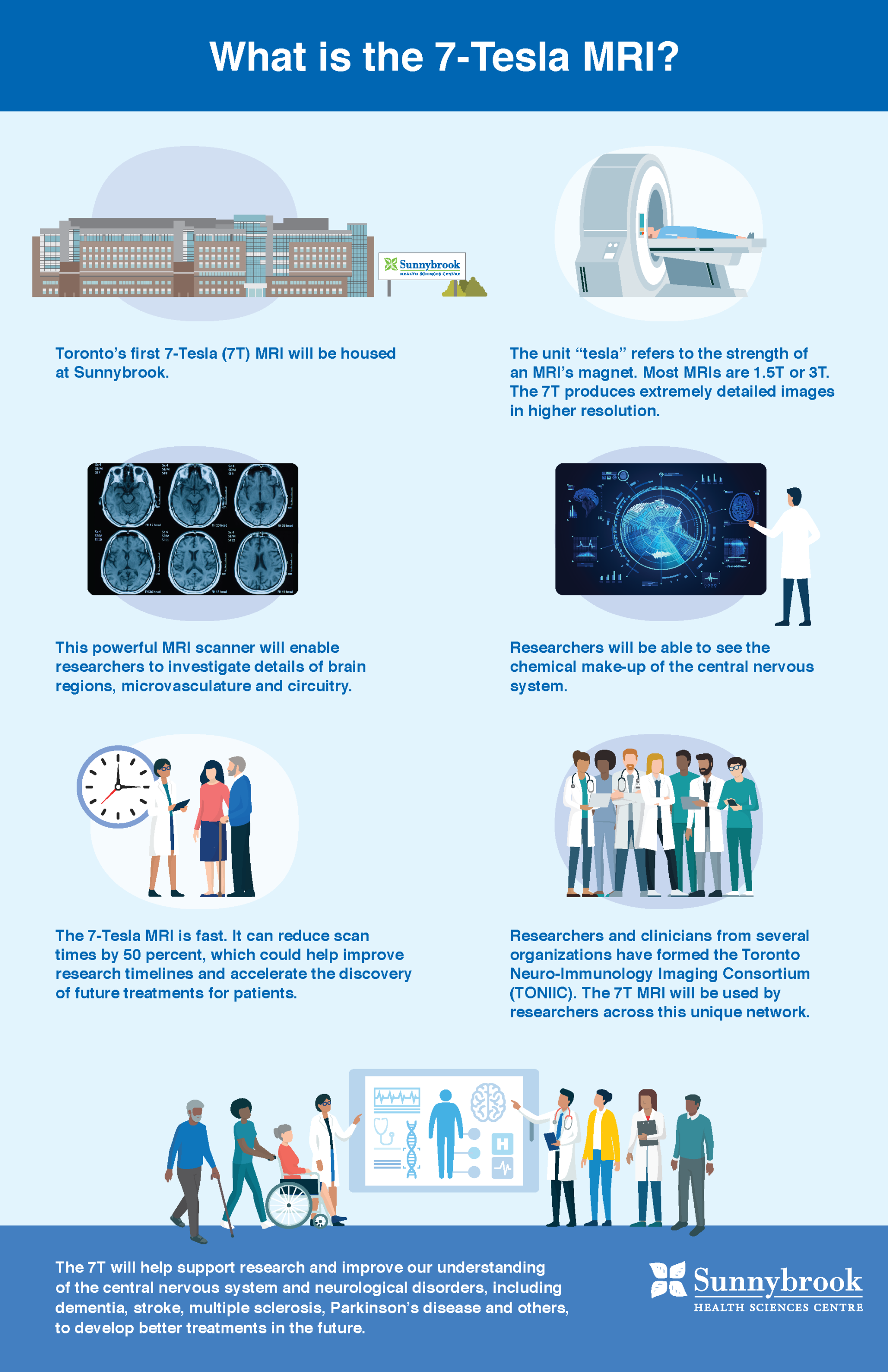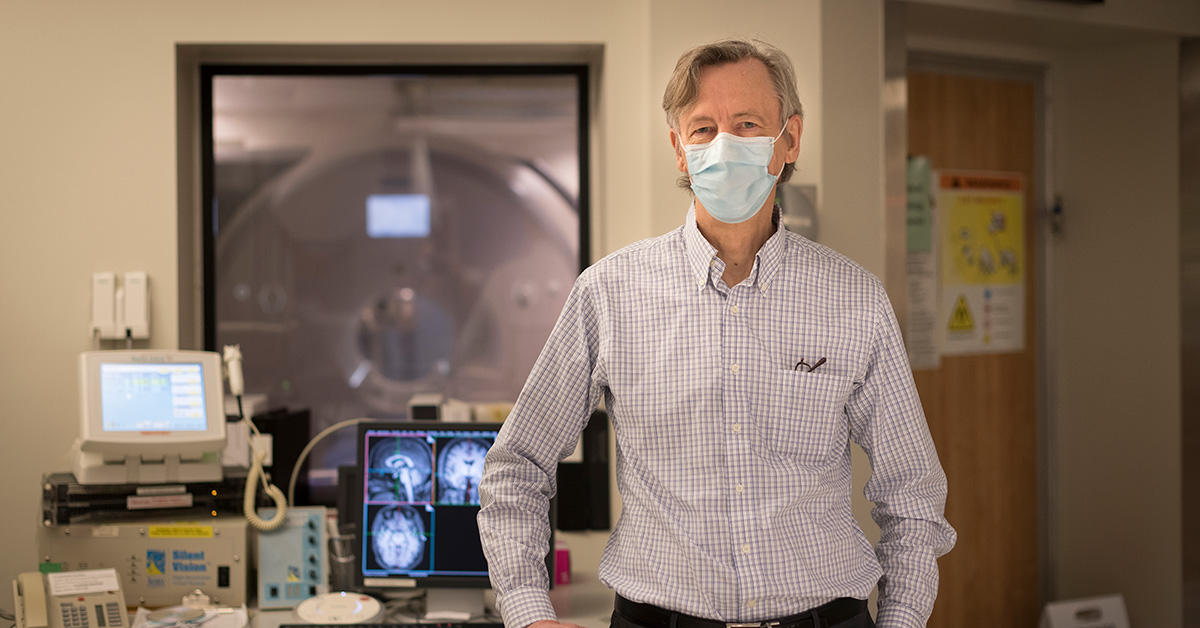Sunnybrook will be home to Toronto’s first 7-Tesla MRI
A $13.9 million grant from the Canada Foundation for Innovation (CFI), made to the University of Toronto (U of T), will bring a powerful new MRI scanner to Sunnybrook Research Institute (SRI) and scientists across Toronto, as part of a new multi-site collaborative research initiative focused on neuroimmunology and neuroimaging for diseases such as stroke, multiple sclerosis and cancer.
On March 3, Prime Minister Justin Trudeau announced more than $518 million to support the infrastructure needs of universities and research institutions across the country. In support of this announcement, the Honourable François-Philippe Champagne, Minister of Innovation, Science and Industry, echoed the government’s commitment to innovation. “Great science and research is the first step in driving innovation. Now more than ever, Canadians are looking to their researchers to develop innovative solutions to real-world problems. The Government of Canada is proud to support today’s funding recipients, who are harnessing their expertise and dedication to make the important discoveries that will serve Canadians now and in the future.”
“Sunnybrook would like to thank the Government of Canada for this significant investment in the future of health care,” says Dr. Kullervo Hynynen, Vice President of Research and Innovation at Sunnybrook Research Institute and Professor of Medical Biophysics at the U of T Temerty Faculty of Medicine. “With the latest scientific technology and the collaboration of researchers across Toronto’s Academic Health Sciences Network (TAHSN), we’ll be able to better understand how the central nervous system (CNS) works with other systems in the body and how these interactions can become damaged in disease.”
The successful research initiative led by principal investigators Dr. Hynynen and Dr. Jennifer Gommerman, Professor of Immunology at the U of T Temerty Faculty of Medicine, is a first of its kind collaboration, leveraging multidisciplinary expertise from the Temerty Faculty of Medicine at U of T and six affiliated hospital research institutions. Together, they form a collaborative new research group called the Toronto Neuro-Immunology/Imaging Consortium (TONIIC), which will apply distinctive research strengths in neuroimmunology and neuroimaging. The 7T MRI will be used by researchers across this unique network. “Questions of CNS health are increasingly interdisciplinary,” says Dr. Gommerman. “So we think it’s a great strategy to marry neuroimmunology and imaging, and study this on multiple scales.”
TONIIC
A critical component to the success of 7T is a unique alliance of institutional expertise and technological savvy in Toronto’s research community.
The Toronto Neuro-Immunology/Imaging Consortium (TONIIC) is an unprecedented collaboration among world-renowned scientists in the discovery of innovative approaches and solutions to complex conditions of the Central Nervous System (CNS).
TONIIC is a partnership of the University of Toronto Temerty Faculty of Medicine (FoM) and six affiliate hospital research institutions with expertise in Neuroimmunology and Neuroimaging.
- Baycrest
- The Centre for Addiction and Mental Health (CAMH)
- The Hospital for Sick Children (SickKids)
- St. Michael’s Hospital
- Sunnybrook Health Sciences Centre
- University Health Network (UHN)
- University of Toronto Temerty Faculty of Medicine
TONIIC’s unique approach to CNS disease considers the body and brain connection to the microbiome which is the genetic material of microbes which are tiny living organisms in and around the body, and the potentially adverse effects from environmental exposures.
TONIIC’s 3 key goals:
- Collaborative research across institutions.
- Train Canada’s next generation of neuroscientists and clinicians to be knowledgeable in both neuroimmunology and neuroimaging techniques.
- Translate TONIIC research into better patient outcomes.
Currently, more than 4 million Canadians live with diseases impacting the central nervous system. Although significant advancements have been made in recent years, effective therapies to treat many of these diseases are still lacking. Researchers from across the TONIIC network will use the new 7-Tesla MRI to better understand issues such as spinal cord structure and function, potentially developing new treatments for diseases such as multiple sclerosis, dementia, stroke and Parkinson's disease.
A microscope into the brain
The 7T MRI produces images in unprecedented detail, allowing researchers to see areas of the nervous system never seen before with MRI. “Compared to commonly used 1.5T or 3T MRIs, the 7T has a much stronger magnetic field, increasing the signal and contrast, which generates a higher resolution image. We will be able to see clearly defined areas of the brain that were previously grainy or invisible,” says Dr. Hynynen.
As a result, researchers will be able to see the brain in microscopic detail, visualizing structures as small as one tenth of a millimeter. The 7T will:
- Enable scientists to see small areas of the brain including sub-regions of the hippocampus, the area of the brain responsible for memory retrieval and function and linked to diseases including epilepsy and Alzheimer’s disease.
- Provide improved visualization of targets within the brain, enabling researchers to better target tumours or areas of the brain responsible for disease.
- Detect subtle traumatic brain injury and microbleeds impossible to detect on other scanners.
- Allow researchers to visualize individual nerve bundles and brain circuitry.
- Provide insight into the chemical make-up of the brain and nervous system.
- Enable researchers to better monitor disease progression in patients with multiple sclerosis or Alzheimer’s.

Image courtesy of Dr. Maged Goubran in collaboration with Drs. Ali Khan, Colin Holmes and Terry Peters.
A new era of brain health at Sunnybrook
Planning is underway to house the 7-Tesla MRI at Sunnybrook beside the Garry Hurvitz Brain Sciences Centre.
“This new technology will be an essential tool for researchers and clinicians, as we work together on groundbreaking discoveries in the central nervous system,” says Dr. Kullervo Hynynen. “With a better understanding of how this system works with other systems in the body, we can potentially develop new treatments for diseases and make a transformative difference in the lives of millions of Canadians.”
Click to view a larger version of the infographic above
» View a plain-text version of the infographic
What is the 7-Tesla MRI?
Toronto’s first 7-Tesla (7T) MRI will be housed at Sunnybrook.
The unit “tesla” refers to the strength of an MRI’s magnet. Most MRIs are 1.5T or 3T. The 7T produces extremely detailed images in higher resolution.
This powerful MRI scanner will enable researchers to investigate details of brain regions, microvasculature and circuitry.
Researchers will be able to see the chemical make-up of the central nervous system.
The 7-Tesla MRI is fast. It can reduce scan times by 50 percent, which could help improve research timelines and accelerate the discovery of future treatments for patients.
Researchers and clinicians from several organizations have formed the Toronto Neuro-Immunology Imaging Consortium (TONIIC). The 7T MRI will be used by researchers across this unique network.
The 7T will help support research and improve our understanding of the central nervous system and neurological disorders, including dementia, stroke, multiple sclerosis, Parkinson’s disease and others, to develop better treatments in the future.







